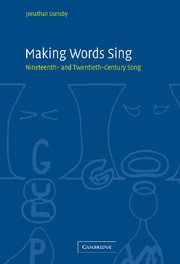Book contents
- Frontmatter
- Contents
- Acknowledgements
- Introduction
- 1 An introduction with no words, with intended words, and untheory
- 2 A love song: Brahms's ‘Von ewiger Liebe’
- 3 Boundless opulence: postscripts on Schoenberg's premonition
- 4 Interlude on peace, laws, flowers, and men flying
- 5 To Amherst via Vienna
- 6 By way of brief conclusion
- Bibliography
- Index
3 - Boundless opulence: postscripts on Schoenberg's premonition
Published online by Cambridge University Press: 23 November 2009
- Frontmatter
- Contents
- Acknowledgements
- Introduction
- 1 An introduction with no words, with intended words, and untheory
- 2 A love song: Brahms's ‘Von ewiger Liebe’
- 3 Boundless opulence: postscripts on Schoenberg's premonition
- 4 Interlude on peace, laws, flowers, and men flying
- 5 To Amherst via Vienna
- 6 By way of brief conclusion
- Bibliography
- Index
Summary
If much of the music discussed in this book can be considered either popular or at least familiar and accessible, the same may not be quite true of Schoenberg's orchestral song ‘Premonition’, Op. 22, No. 4, or indeed music of Kurtág and Berberian to be discussed in Chapter 4. Although Op. 22 is mentioned often enough in the Schoenberg literature, this is not a work that is frequently performed or that has been recorded by many different artists. There is something difficult about the music; as has been perfectly obvious for nearly a century, there is something ‘difficult’ about Schoenberg's music anyway.
The encouraging title of this chapter, ‘Boundless opulence’, is a translated phrase taken from Alban Berg's apparently discouraging essay, to go by its famous title at least, ‘Why is Schoenberg's Music So Hard to Understand?’. Although that issue, of the nature of the difficulty of understanding Schoenberg's music, is not the main issue in this chapter, there will be some attempt to deal with it obliquely; this will not be by avoiding it, but in a sense by complicating it (as a by-product rather than an intention) by asking what ‘difficulty’ may mean in the context of vocality. It is not so much a question of whether Schoenberg's music for voice and instruments is inherently more difficult than his purely instrumental music, or his a cappella vocal music, one choice item of which will be contemplated more briefly in Chapter 4; rather the question is whether ‘difficulty’ is a useful paradigm for musical thinking, paying all due respect to Berg's rhetorical purposes in foregrounding what appears on the face of it to be a negative – or at least hardly uplifting – approach to assimilating avowedly ‘modernistic’ music.
- Type
- Chapter
- Information
- Making Words SingNineteenth- and Twentieth-Century Song, pp. 57 - 74Publisher: Cambridge University PressPrint publication year: 2004
- 1
- Cited by

